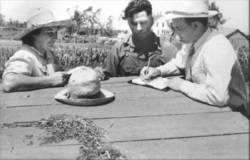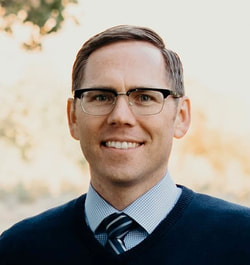 I recently made the statement that Extension is Broken. While many of my colleagues in the Cooperative Extension System applauded me for exclaiming, "the emperor has no clothes!" I can't just leave it alone. What good is it to say something is broken if we don't share ideas and take action to fix it? I believe ideas are nearly worthless without implementation. Derek Sivers taught me this. Instead of writing one really long blog post about all the ideas I have that could improve Cooperative Extension, I thought it would be better to break it up into a series of posts, each with three ideas we can start taking action on right away. I know you have ideas too. Please tweet me or find me on Instagram and lets share. I want to know how you are working to fix Extension (#FixExt).
Let's get started: 1. Our value has always been in the face-to-face. We can never forget this. Yes, we cover larger areas now. Yes, we have limited resources. Yes, there are so many clients to serve. But we can't just sit at our desks, make calls, check emails, tweet, post to Facebook etc. We have to be out amongst the people. "But Paul, that's what I do! That's why I got into Extension in the first place." Good, I'm not talking to you. Let's keep serving our clients and improving their lives. I'm talking to the agents that have become tired and complacent in their work. Let's be honest, we all know agents who don't do anything, or could do a lot more. I love the Extension Worker's Code, remind yourself why you love the vision of Extension. Believe in your work and get to work. 2. Start tweeting. Maybe you've already set-up your twitter account, so start sharing your content. Do you think Twitter is overwhelming? Does it make you uncomfortable. Good, you can only grow when you're outside of your comfort zone. The eXtension Network Literacy CoP is here to help. Join this Twitter Cohort and dive in. YOu need to utilize Twitter.com/searchm it's a powerful feature. Search by keywords in your area of expertise and join the conversations. You're the expert: dispel myths, answer questions, and share Cooperative Extension's unbiased, research-based information. You've only got 140 characters, so chop up the best statements in your fact sheet and use a shortened URL when you tweet it out to the world. It's okay to share the same fact sheet, blog post, or journal article more than once. Search by near: [your zip code] within: [x km] to find out what people are saying in your area. Include a keyword to refine the search. For example, this is what I type into twitter search to see what people are talking about in my county: near:84770 within:100km. We must be proactive about disseminating our information, it's not like people are lining up at our offices anymore. 3. Become a public intellectuals. Mission Extension blogger Jim Langcuster, known to many as @ExtensionGuy, explains that public intellectuals are, "defined as the thinkers, usually journalists and academics, who not only articulate but also offer constructive solutions to the most pressing public policy issues of the day." On the whole, we have lost our influence with the public. One of my colleagues put it, "Extension used to be Google." Another said, "The Extension Agent used to be the go-to authority on everything. He was the connection to the Land-Grant University. When people needed information, they asked the Extension Agent." It's 2013, the world has changed and Google returns over five billion queries per day. In a blog post from 2011, Jim stated, "Extension’s longstanding role as a scientific vanguard is under serious threat." I echo his call for Extension professionals to become public intellectuals: We need to begin cultivating the talents of our best scientific educators. We must train a new national cadre of Extension educators to become spokespersons in the fullest measure of this term — people fully equipped to capitalize on opportunities to educate our diverse audiences about food-and-fiber issues and other highly complex, largely misunderstood issues — public intellectuals. This cadre of spokesperson must be trained to become effective social media users, skilled op-ed writers and highly effective and compelling speakers — simply put, a vanguard of educators fully equipped to engage other intellectuals at the levels of discourse and to provide insights in deeply enriched contexts. Cooperative Extension’s history has uniquely equipped us for such a role.
1 Comment
|
Paul Hill, Ph.D.I design, plan, and evaluate economic development programs for Utah State University. Archives
September 2022
Search this site:
|

 RSS Feed
RSS Feed
